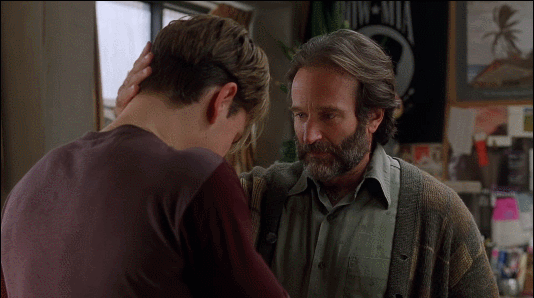Good Will Hunting: A Beautiful Eulogy
It can be difficult watching Good Will Hunting knowing that Robin Williams is dead. What could possibly be one of his most powerful, heartfelt roles seems all the more painful in light of the actor's passing. Known mainly for his comedic roles, it's easy to forget that Robin Williams could rule drama as well as any dramatist - and usually with much more depth and genuine emotion thanks to his refusal to separate humor and tragedy. As with life, Good Will Hunting is the combination of both and the experience of watching it can seem like a beautiful eulogy for an actor whose impact cannot be measured.
Robin Williams plays the role of Sean Maguire, an MIT graduate who teaches at a local Boston community college. Sean wasn't born great; he was born in South Boston, a rundown area where the poor Irish Catholics live in stark contrast to northern Boston, the college town area where Harvard makes its home. Adding to the contrast, his roommate during college, Gerald Lambeau (Stellan Skarsgard), is working as an MIT professor and the recipient of the Fields Medal, the "Nobel Prize of Mathematics." Lambeau is an elitist - though not an inherently malicious one - who lambasts Sean for teaching at a community college when he could be so much more. Lambeau also believes that Sean is jealous of his accomplishments and is resentful of him, which is why they never see each other at any of the MIT reunions. Sean defends himself, saying that he doesn't do what he does for the recognition or the prestige but because it makes him happy. "The little things," in essence, provide him with happiness. Recognizing this and learning to accept this, Lambeau and Sean begin repairing their lost friendship.
Lambeau is also the person who discovers Will Hunting, the titular genius, and delivers him to Sean when going to a therapist becomes necessary for him to avoid going to prison. Sean's shared background with Will is what brings the two together. They have similar senses of humor, clash when it comes to knowledge versus wisdom, and ultimately find in each other the family that they'd been seeking for so long. Sean's wife died a few years prior and he has been despondent and aloof ever since, while Will is still nursing wounds (many of which are quite literal) from his foster parents. Sean, similarly, had to deal with an abusive childhood. Sean becomes the father figure that Will never had and the amount of emotion released in their final scenes allows them to overcome their respective roadblocks.
What makes this role so compelling in light of Robin Williams's death has much to do with the way the film frames Sean Maguire's journey. Sean's despondency in light of his wife's death is criticized by Will, who claims that the man has given up hope of ever being as happy as he was back then. Sean, somewhat hypocritically, relates to Will that he has to take chances if he ever hopes to have genuine human connections with people, especially objects of love and romance. Eventually - and no one thing triggers it - Sean begins to see Will's point about having given up on love, and decides to travel the world where, potentially, he will once again find the love that he had lost when his wife died. When Will leaves for California in his new car and leaves Sean a note telling him that "he has to go see about a girl" - the same thing Sean had said to his friends before going to approach his wife in lieu of watching the 1975 World Series - Sean remarks with a grin, "Son of a bitch stole my line."
Sean Maguire's character arc is all about moving on and learning to love again despite the tragedy of death that hangs above his character. In many ways, those who have appreciated Robin Williams for the impact he has carried through his work have had to do the same thing. It's hard losing Robin Williams, and many considered his loss similar to having lost a friend or family member; this one is especially hard since so many of his films are beloved. But as Sean Maguire demonstrates, not everything has to be depressing all the time. "The little things" can still makes us happy and, eventually, we learn that we can try and recapture that happiness again. It's not a guarantee, it's not even always possible. But if we don't ever try, if we're never passionate to experience happiness again, then what's the point?
Sean Maguire saw the point. Will Hunting saw the point. And they reached for the stars.
Lambeau is also the person who discovers Will Hunting, the titular genius, and delivers him to Sean when going to a therapist becomes necessary for him to avoid going to prison. Sean's shared background with Will is what brings the two together. They have similar senses of humor, clash when it comes to knowledge versus wisdom, and ultimately find in each other the family that they'd been seeking for so long. Sean's wife died a few years prior and he has been despondent and aloof ever since, while Will is still nursing wounds (many of which are quite literal) from his foster parents. Sean, similarly, had to deal with an abusive childhood. Sean becomes the father figure that Will never had and the amount of emotion released in their final scenes allows them to overcome their respective roadblocks.
What makes this role so compelling in light of Robin Williams's death has much to do with the way the film frames Sean Maguire's journey. Sean's despondency in light of his wife's death is criticized by Will, who claims that the man has given up hope of ever being as happy as he was back then. Sean, somewhat hypocritically, relates to Will that he has to take chances if he ever hopes to have genuine human connections with people, especially objects of love and romance. Eventually - and no one thing triggers it - Sean begins to see Will's point about having given up on love, and decides to travel the world where, potentially, he will once again find the love that he had lost when his wife died. When Will leaves for California in his new car and leaves Sean a note telling him that "he has to go see about a girl" - the same thing Sean had said to his friends before going to approach his wife in lieu of watching the 1975 World Series - Sean remarks with a grin, "Son of a bitch stole my line."
Sean Maguire's character arc is all about moving on and learning to love again despite the tragedy of death that hangs above his character. In many ways, those who have appreciated Robin Williams for the impact he has carried through his work have had to do the same thing. It's hard losing Robin Williams, and many considered his loss similar to having lost a friend or family member; this one is especially hard since so many of his films are beloved. But as Sean Maguire demonstrates, not everything has to be depressing all the time. "The little things" can still makes us happy and, eventually, we learn that we can try and recapture that happiness again. It's not a guarantee, it's not even always possible. But if we don't ever try, if we're never passionate to experience happiness again, then what's the point?
Sean Maguire saw the point. Will Hunting saw the point. And they reached for the stars.



Comments
Post a Comment